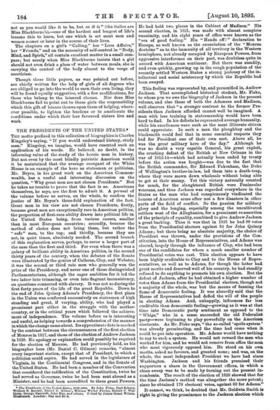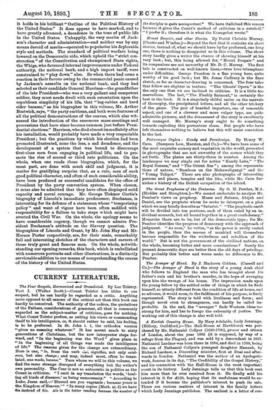THE PRESIDENTS OF THE UNITED STATES.* THE motto prefixed to
this collection of biographies is Charles Kingsley's saying, "If you would understand history, study men." Kingsley, we imagine, would have resented such an application of his words. He believed, no doubt, in the informing value of the study of the heroic man in history. But not even by the most blindly patriotic American would it be maintained that the average occupant of the White House is an example of the hero as statesman or politician. Mr. Bryce, in his great work on the American Common- wealth, has a useful and interesting discussion on the question, "Why great men are not chosen Presidents." But he takes no trouble to prove that the fact is so. Americans themselves, he says, are the first to admit it. A perusal of the volume before us serves, on the whole, to confirm the justice of Mr. Bryce's three-fold explanation of the fact. Great men in his view are not chosen Presidents, firstly, because great men are exceptionally rare in American politics, the proportion of first-rate ability drawn into political life in the United States being, from various causes, smaller than in most European countries ; secondly, because the method of choice does not bring them, but rather the "safe" men, to the top; and thirdly, because they are not, in quiet times, absolutely needed. The second branch of this explanation serves, perhaps, to cover a larger part of the case than the first and third. For even when there was a galaxy of brilliant ability in American politics, in the second thirty years of the century, when the debates of the Senate were illustrated by the genius of Calhoun, Clay, and Webster, it was the second or third rate men who generally won the prize of the Presidency, and never one of those distinguished Parliamentarians, although the eager ambition for it led the two latter into trimming, or even into flagrant inconsistency, on questions connected with slavery. It was not so during the first forty years of the life of the great Republic. Down to the end of John Quincy Adams's Presidency, the first place in the Union was conferred successively on statesmen of high standing and great, if varying, ability, who had played a prominent part either in the struggle with the mother. country, or in the critical years which followed the achieve- ment of independence. The volume before us is interesting and useful, as helping towards a comprehension of the manner in which the change came about. Its approximate date is marked by the contrast between the circumstances of the first election of Monroe in 1817, and those of the election of Andrew Jackson in 1829. No apology or explanation could possibly be required for the election of Monroe. He had previously held, as his biographer here (Mr. Daniel C. Gilman) remarks, "almost every important station, except that of President, to which a politician could aspire. He had served in the legislature of Virginia, in the Continental Congress, and in the Senate of the United States. He had been a member of the Convention that considered the ratification of the Constitution, twice he had served as Governor, twice he had been sent abroad as a Minister, and he had been accredited to three great Powers.
• The Presidents of the 17nite4 States, 1759-1894. By John Fiske, Carl Schurz, William E Russell, Daniel C. Gilmer, William Walter Phelps, Robert C. Win- throp, George Bancroft, John Hay, and others. Elited by James Grant Wilson. Illustrated. London: Gay and BEd. He had held two places in the Cabinet of Madison." His second election, in 1821, was made with almost complete unanimity, and his eight years of office were known as the "era of good feeling." His "Hands off ! " declaration to Europe, so well known as the enunciation of the "Monroe doctrine" as to the immunity of all territory in the Western hemisphere, not already occupied by European Powers, from aggressive interference on their part, was doubtless quite in accord with American sentiment. But there was steadily, and even quickly, growing up in the rough population of the recently settled Western States a strong jealousy of the in- tellectual and social aristocracy by which the Republic had been swayed.
This feeling was represented by, and personified in, Andrew Jackson. That accomplished historical student, Mr. Fiske, to whose pen we owe the biography of Jackson in the present volume, and also those of both the Adamses and Madison, well observes that "a stronger contrast to the former Pre- sidents than Jackson afforded cannot well be imagined. A. man with less training in statesmanship would have been hard to find. In his defects he represented average humanity, while his excellences were such as the most illiterate citizen could appreciate. In such a man the ploughboy and the blacksmith could feel that in some essential respects they had for President one of their own sort. Above all, he was the great military hero of the day." Although he was no doubt a very capable General, his great exploit, the crushing defeat of the British at New Orleans in the war of 1812-14—which had actually been ended by treaty before the action was fought—was due to the fact that the British commander, Sir Edward Pakenham, the Duke of Wellington's brother-in-law, led them into a death-trap, where they were mown down wholesale without being able to get at their enemy. Yet this victory naturally counted for much, for the slaughtered British were Peninsular veterans, and thus Jackson was regarded everywhere in the States as the man who had conspicuously vindicated the honour of American arms after not a few disasters in other parts of the field of conflict. So the passion for military glory and the longing, especially among the uncultivated settlers west of the Alleghanies, for a prominent re-assertion, of the principle of equality, combined to give Andrew Jackson a great backing. Thus it was that in 1825 he had 99 votes from the Presidential electors against 84 for John Quincy Adams ; but there being no absolute majority, the choice of President was thrown, under the provisions of the Con- stitution, into the House of Representatives, and Adams was elected, largely through the influence of Clay, who had been one of the candidates for whom a much smaller number of Presidential votes was cast. This election appears to have been highly creditable to Clay and to the House of Repre- sentatives, as well as to Adams, for though the latter had great merits and deserved well of his country, he had steadily refused to do anything to promote his own election. But the defeat of Jackson, after he had obtained a higher number of votes than Adams from the Presidential electors, though not a majority of the whole, was but the means of fanning the flame of democratic feeling. It was absurdly said that the House of Representatives had defied the will of the people in electing Adams. And, unhappily, influences far less creditable than democratic feeling—growing as it was at that time into Democratic party sentiment as opposed to the "Whigs," who in a sense succeeded the old Federalist party—were beginning to play powerfully on the American electorate. As Mr. Fiske says, "the so-called 'spoils system was already germinating, and the time had come when it could be put into operation. Mr. Adams would have nothing to say to such a system. He would not reward the men who, worked for him, and he would not remove from office the men who most vigorously opposed him. He stood on his own merits, asked no favours, and granted none ; and was, on the whole, the most independent President we have had since Washington. Jackson and his friends promised their supporters a share in the Government offices, in which a clean sweep was to be made by turning out the present in- cumbents. The result of the election of 1828 showed that for the time Jackson's method was altogether the more potent; since he obtained 178 electoral votes, against 83 for Adams."
It cannot, we think, be doubted that Mr. G-oldwin Smith is right in giving the prominence to the Jackson election which it holds in his brilliant "Outline of the Political History of the United States." It does appear to have marked, and to have greatly advanced, a decadence in the tone of public life in the United States. Unhappily, the very merits of Jack- son's character and administration—and neither was by any means devoid of merits—operated to popularise his deplorable style and methods. The standard of political warfare being lowered on the Democratic side, which upheld the "strict con- struction" of the Constitution and championed State rights, the Whigs, who favoured internal improvements under Federal authority, the national bank, and a high import tariff, were constrained to "play down" also. So when there had come a reaction in their favour owing to the commercial panic caused by Jackson's assaults on the national bank, and they had selected as their candidate General Harrison—the grandfather of the late President—who was a very gallant and competent soldier, they must needs dwell with such ostentation upon the republican simplicity of his life, that "log-cabins and hard cider became," as his biographer in this volume, Mr. Arthur Bostwick, says, "the party emblems, and both were features of all the political demonstrations of the canvas, which also wit- nessed the introduction of the enormous mass-meetings and processions that have since become common just before Presi- dential elections." Harrison, who died almost immediately after his installation, would probably have made a very respectable President ; but the practices by which his election had been promoted illustrated, none the less, a sad decadence, and the development of a system that was bound to discourage first-class men from engaging in political life, and to pro- mote the rise of second or third rate politicians. On the whole, when one reads these biographies, which, for the most part, are done with much skill and judgment, it is matter for gratifying surprise that, as a rule, men of such good political character, and often of such considerable ability, have been produced as successful candidates for the office of President by the party convention system. When chosen, it must also be admitted that they have often displayed solid capacity and moral courage. Mr. George Ticknor Curtis's biography of Lincoln's immediate predecessor, Buchanan, is interesting for its defence of a statesman whose "temporising policy" and want of vigour have been often saddled with responsibility for a failure to take steps which might have averted the Civil War. On the whole, the apology seems to have considerable cogency, though we cannot admire Pre- sident Buchanan's attitude on the Slavery question. The biographies of Lincoln and Grant, by Mr. John Hay and Mr. Horace Porter respectively, are, for their scale, remarkably lull and interesting sketches of the characters and careers of those truly great and famous men. On the whole, notwith- -standing our opening remarks, this book, which is embellished with numerous portraits and other illustrations, is a distinctly serviceable addition to our means of comprehending the course of the history of the United States.



































 Previous page
Previous page